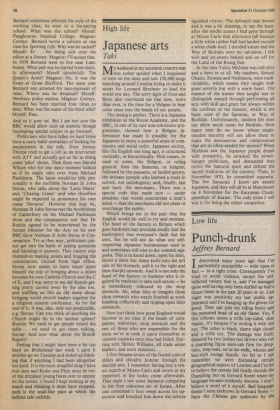High life
Japanese arts
Taki
y weekend at my ancestral country seat was rather spoiled when I happened to turn on the news and saw 150,000 mugs marching around London trying to make it easier for Leonard Brezhnev to lead the world one day. The sorry sight of Foot and Benn also convinced me that now, more than ever, is the time for a Shogun to beat some sense into the heads of our people.
The timing is perfect. There is a Japanese exhibition at the Royal Academy, and the BBC, in one of its rare non-subversive programmes, showed how a Shogun inheritance has made it possible for the Japanese to enjoy a powerful sense of community and social order. Japanese society, like the English one long ago, is structured vertically, or hierarchically. First comes, or used to come, the Shogun, or ruling general; then the Samurai, or knights; followed by the peasants, or landed gentry; the artisans (people who learned a trade in school, not sociologists); and, finally, last and least, the merchants. There was a special code that made sure — under penalties that would concentrate a man's mind — that the merchants did not cheat or overcharge the public.
Which brings me to the part that the English would do well to try and emulate. The head of the factory in Britain which goes bankrupt may proclaim loudly that the bankruptcy was everyone's fault but his own, but he will not do what any selfrespecting Japanese businessman used to and sometimes still tries to do: commit suppuku. This is to kneel down, open his shirt, thrust a short but sharp knife into the left side of his stomach, pull it to the right and then sharply upwards. And it is not only the head of the factory or business who is required by tradition to take such action — he is immediately followed by the shop stewards. Ah, what bliss to imagine those shop stewards who watch football at work kneeling collectively and ripping open their stomachs.
Now just think how great England would become in no time if the heads of companies, ministries, shop stewards and the rest of those who are responsible for the mess we're in took it upon themselves to commit suppuku once they had failed. Starting with Shirley Williams, all trade union leaders, and most ministers.
I first became aware of the feudal code of ethics and chivalric honour through the martial arts. I remember having lost a tennis match at Monte Carlo and sworn at my opponent in the locket room afterwards. That night I saw some Japanese competing in the then unknown art of karate. After one contestant's foot swept across his opponent and knocked him down the referee signalled victory. The defeated man bowed and it was a bit shaming, to say the least, after the sordid scenes I had gone through at Monte Carlo that afternoon (all because a little white rubber ball had landed outside a white chalk-line). I decided karate and the Way of Bushido were my salvation, I left wife and jet-setters behind and set off for the Land of the Rising Sun.
At the time Yukio Mishima was still alive and a hero to us all. My teachers, Senseis Okano, Enoeda and Nishimura, were traditionalists, which means they taught with great severity but with a warm heart. The essence of the karate they taught was to distinguish oneself through performing all acts with skill and grace but always within the confines of the honour, which is the basic code of the Samurai, or Way of Bushido. Unfortunately, modern life does not allow much room for Bushido. How many men do we know whose singleminded sincerity will not allow them to make the manoeuvres and compromises that are so often needed for success? When Mishima saw the Japanese people drunk with prosperity, he attacked the powerhungry politicians, and demanded they revive the Samurai spirit and defend the sacred traditions of the country. Then, in November 1970, he committed suppuku. The few Samurais I know are mostly Japanese, and they will all be at Manchester on 8 November for the European Championships of Karate. The only prize I will win is for being the oldest competitor.






































 Previous page
Previous page